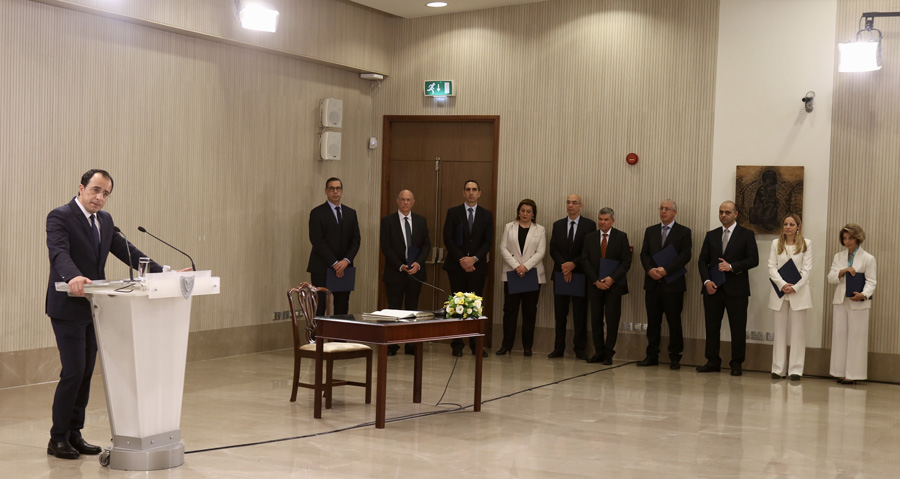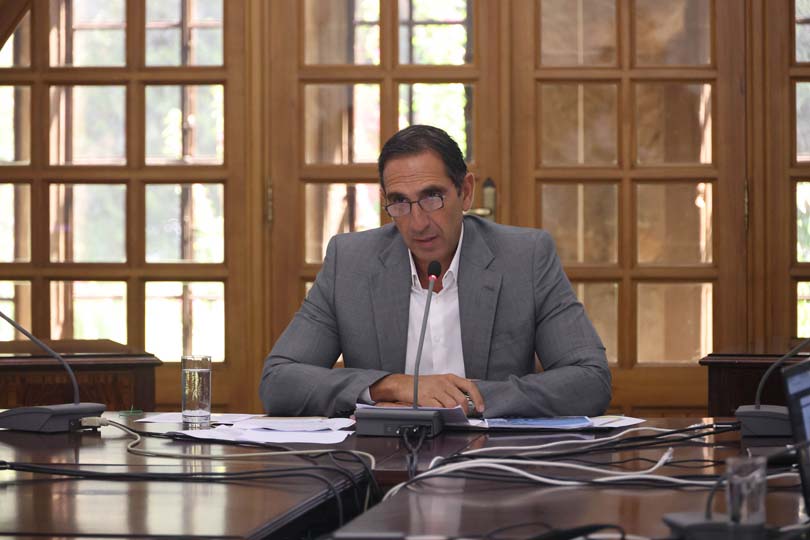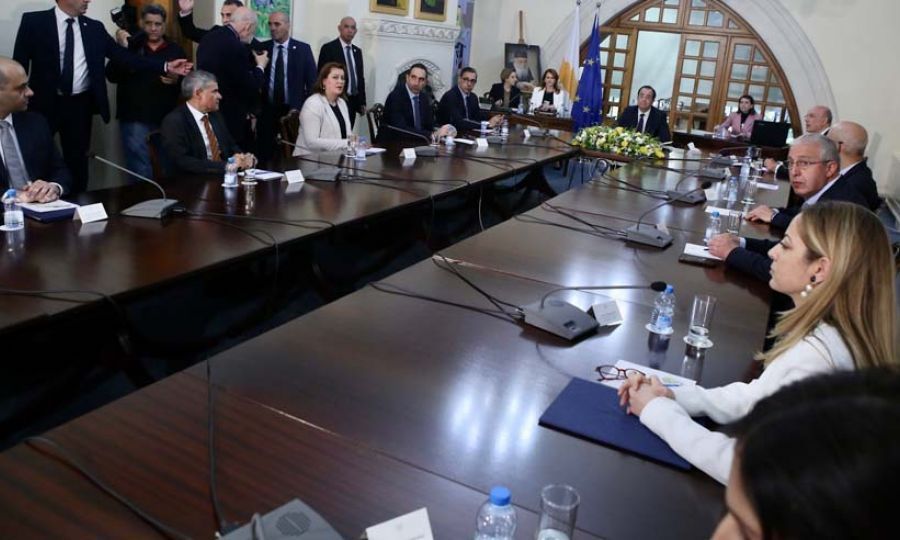

Marina Economides
In May 2022, Nikos Christodoulides announced his candidacy for the Presidency of the Republic, only to be overshadowed by the revelation of a partially plagiarized speech from Ioannis Kasoulides during the 2008 presidential election. This revelation not only went viral on social media, exposing Christodoulides, but also posed a serious threat to the foundations of his nascent campaign. Reacting swiftly, Christodoulides attempted to quell the implications by blaming his ex-Greek communicator George Flesas, immediately terminating their cooperation. While some interpreted this move as Christodoulides evading political responsibility, others saw it as a determined effort to dismiss associates causing damage, unlike Nicos Anastasiades, who struggled to sever ties with his associates.
One such example was the Deputy Minister of Research, Innovation and Digital Policy. Philippos Hadjizacharias, unexpectedly finding himself at the center of the controversy, resigned for reasons of dignity, triggering a domino effect of developments. Christodoulides, facing a major crisis, refrains from making decisive moves to turn the tide. Instead, he blames certain individuals in the Cabinet through whispers and leaks, creating a self-imposed political spin leading to partial ungovernability and a short circuit among ministers.
At the Leaders' Meeting
Contrary to expectations, neither the President's interview nor last Sunday's newspaper headlines hinted at Nicos Christodoulides' intention to proceed with a reshuffle. Throughout the ongoing issues, Christodoulides has been known for his tendency to extensively discuss matters with various individuals, leaking information about his discomfort with Cabinet members and sounding out close associates. Three weeks ago, during a meeting with political leaders, DIPA President Marios Karoyian directly asked Christodoulides about the rumored reshuffle. Christodoulides affirmed the rumors, setting a specific timetable for January. However, no further discussion ensued, and the leaders did not provide names for consideration, intending to discuss the matter later.
Aware that the existing Cabinet had an expiry date, with the open invitation to DISY and ongoing rumors since the first 100 days of his administration, Christodoulides expressed discomfort this summer with the handling of various ministers. The reshuffle debate gained momentum, accelerated by DISY's indication that they would not join the government. Christodoulides' unease extended to the handling of Popi Kanari, the clash with Christina Giannakis, and the dissatisfaction with Justice Minister Anna Koukkidou Prokopiou.
The Prolonged Rumor of a Reshuffle
The prolonged rumor of a reshuffle has inflicted damage on the government for several reasons:
- It is an admission of failure by the Christodoulides administration.
- Ministers long rumored to leave are now unnerved, hindering decision-making and causing relative ungovernability.
- Frustration within the Cabinet grows over uncertainties about who will stay or leave, with Hadjizacharias's resignation increasing pressure on perceived weak links.
- Political leaders anticipate attrition in the run-up to the election from disgruntled departing ministers or those aspiring to be ministers who remain unused.
- The question emerges: Why would any politician align with a government where the President not only fails to support them during crises but also views them as expendable?
The new morals
Christodoulides' leadership footprint raises questions about his decision-making and protective role in crises compared to his political predecessors. Unlike Nicos Anastasiades, who supported his ministers during crises, Christodoulides appears unwilling to build stronger relationships with his cabinet, either due to a lack of consultation or a belief that some are expendable.
Ministers in Turmoil
Amid the reshuffle discussions, most Cabinet members attempt to contact political leaders and the President's inner circle rather than the President himself to verify their status. This turmoil, coupled with the annoyance of the ruling parties, prompted the President to manage the crisis publicly, advising Cabinet members to ignore rumors and ensuring they won't hear about resignations from newspapers.
The President's Man
 Nikos Christodoulides' most trusted confidant within the Cabinet is Konstantinos Ioannou. They share a close bond, and Christodoulides frequently seeks his counsel on matters concerning the Cabinet.
Nikos Christodoulides' most trusted confidant within the Cabinet is Konstantinos Ioannou. They share a close bond, and Christodoulides frequently seeks his counsel on matters concerning the Cabinet.
An exception to this is Konstantinos Ioannou, with whom Nikos Christodoulides has fostered a remarkably close connection. The Minister of the Interior has long been regarded as the intermediary for communication with DISY, except for Efthymios Diplaros and Nikos Tornaritis, who had direct access to the Presidential Office. According to reliable sources from "K," Christodoulides had engaged in discussions with Ioannou regarding the potential replacement of the Minister of Health, exploring various names. Among the individuals Christodoulides sought was a high-ranking executive from DISY, who declined, and a well-known academic, the acceptance of whom remains uncertain. Simultaneously, the name of the esteemed doctor and brother of Kostas Kadi, Savva, resonated prominently. The inclusion of former MP Angelos Votsis added further depth to the discussions. However, when asked by "K" for a comment on the circulating information, Votsis chose to abstain.
Keravnos, Panteli and in the background Piki
Both Konstantinos Ioannou and the circles surrounding Nikos Christodoulides have consistently emphasized to him the need for the Presidency to be occupied by an individual with a distinct political impact. Some advocates have even endorsed the notion of bringing Vassilis Palmas back to the Presidency, given the excellent rapport he shares with the President of the Republic. Currently, there have been no discussions between the two regarding Palmas' potential ministerial appointment or participation in the ministerial structure. It's not out of the question that if the rumored move of Irini Piki to the Ministry of Finance, as Deputy Minister instead of the President, materializes, Makis Keravnos might be intensively considered for departure. Initially seen by some as an emergency solution when Tasos Yasemidis' ministerial appointment faced a veto, Keravnos, however, appears uncomfortable with the President. This discomfort is not solely due to his role as a pivotal figure in the Papadopoulos government but also stems from a lack of a substantive relationship and consultation with the President of the Republic on crucial matters. Furthermore, the working environment in the ministry is less than ideal, with strained relations with its General Manager, Giorgos Pantelis, evident. This strain becomes more apparent in the Finance Committee, where Pantelis often expresses DISY's stance on the state payroll, not necessarily aligning with the views of his political superior. The relationship with Ms. Piki is also strained, either due to her purported positive reception of a move to the Ministry of Finance or due to emerging disagreements in coordinating and overseeing the work of ministers. Deputy Minister of Innovation Philippos Hadjizacharias managed to leave before being succeeded by chief scientist Dimitris Skouridis, a name prominently in consideration, alongside CYTA CEO Andreas Neocleous. The search for a Deputy Minister of Tourism is underway, and dissatisfaction is growing for Minister of Agriculture Petros Xenophontos due to his handling of Akamas. Ministerial names are being tossed around, with reports placing Anastasia Papadopoulou in contention for the position of Minister of Justice, although authoritative sources from "K" suggest otherwise. Additionally, new positions that reshape the political landscape should not be overlooked in the discussion, such as the Deputy Minister for Immigration or the Deputy Minister for European Affairs, with the name of Andreas Kettis, Head of the European Parliament's office in Cyprus, gaining prominence.
Party Leaders on a Tightrope
Nevertheless, as discussions on restructuring gain momentum, the President of the Republic must simultaneously address the dissatisfaction of the co-governing parties. As per information from "K," party leaders and officials were disconcerted by their outright exclusion from the restructuring issue, particularly by the President's stance in his interview with "F," where he completely overlooked them in the process. While DIKO has solidified the departure of Popis Kanaris, their chosen representative, the potential exits of Anna Koukkidou and, especially, the removal of Energy Minister Giorgos Papanastasiou pose challenges within the party, given that the latter was a personal choice of Nikolas Papadopoulos. Both DIKO and the Democratic Party are grappling with a pervasive sentiment among executives that they bear the brunt of a government that disregards their input, leaving them with no real share of power. It's not coincidental that the reshuffle is heightening concerns within the co-governing parties about its impact on the electoral percentages they might garner in June. This concern stems not only from increased internal focus following the departure of their ministers but also because a pre-election reshuffle eliminates incentives for ambitious party executives to contribute to their party. A subpar result in the European elections will escalate internal pressures within the parties and exacerbate already strained relations with the government. The only potential remedy for Nikos Christodoulides is an immediate reshuffle involving individuals who can enhance the government's image, improve co-governance dynamics, and convey a message of a fresh start for Nikos Christodoulides. What raises concerns is that, following Philippou Hadjizacharias' resignation and the ensuing chain of events, the situation appears to be spiraling out of control, with the President seeming ill-prepared to reshape and enhance his already tarnished image.
[This article first appeared in Kathimerini's Sunday printed edition and was translated from its Greek original]































